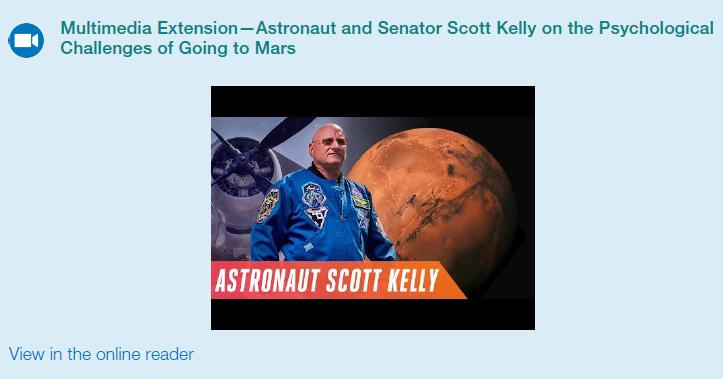Mars is a long way away-33.9 million miles to be exact-from Earth. But, that hasn't stopped NASA
Question:
Mars is a long way away-33.9 million miles to be exact-from Earth. But, that hasn't stopped NASA from gaining approval in the bipartisan NASA Authorization Act of 2010 to send humans to Mars in the 2030s. While there are amazing technological and physical challenges associated with such an audacious goal, there are also serious organizational behavior challenges in terms of managing emotions and stress during the six- to nine-month-long journey there and back. Retired astronaut Scott Kelly, who spent one year on the International Space Station, says, "During my time in orbit, I lost bone mass, my muscles atrophied, and my blood redistributed itself in my body, which strained my heart. Every day, I was exposed to 10 times the radiation of a person on Earth, which will increase my risk of a fatal cancer for the rest of my life. Not to mention the psychological stress, which is harder to quantify and perhaps as damaging." Lauren Landon, a research scientist at the Johnson Space Center at NASA's Human Research Program, is helping prepare astronauts to safely and successfully go on the mission to Mars. To help understand the challenges, Landon says, "Imagine yourself on a team of six of your colleagues locked in a space the size of a Winnebago camper for two and a half years." The stressors are real. It is a life or death situation every day in the hostile environment of space before they can even get to Mars. Because they are so far away, they cannot communicate to Mission Control in real time. There is no social support in the form of friends and family. They have no escape plan. They are in the situation for the duration. And, as retired cosmonaut Yuri Onufrienko notes, "If you think about taking a family trip, whether it's with your spouse or with your family, and never getting out of the car, you can imagine some problems are going to crop up no matter how well you get along." For this very reason, part of Landon's job is to prepare astronauts to be full-time colleagues and roommates who can problem-solve interpersonally as well as technically.
There are several stress management techniques available to help astronauts deal with these challenges. For example, they do have some physical privacy in their own private "closet" with their own things with a door that closes. They eat special food designed to help them. They exercise for several hours per day. They also have several tools available to help them deal with interpersonal stressors and challenging emotions. Still, in such close proximity to one another, little stressors can build up over time.
Landon gives an example of how stressful interpersonal issues can be. If you have a colleague who clears their throat a few times a day here on Earth that is one thing. But if you had to hear that sound every day for two and a half years, that might be a different issue. To reduce the stress for the astronauts, they are trained to manage conflict and self-correct. One example is the team debrief which is designed to help the astronauts call out concerns, observations, and to ask questions. This requires a psychologically safe space to keep stress to a minimum and deal with small interpersonal issues before they become large issues. There are many tools available to help with this process. For example, they even have a mechanism to anonymously share a concern and the program will take that in and generate a discussion guide for everyone to go over. Additional research designed to give NASA further tools and insights is ongoing. For example, in 2017, six engineers and scientists voluntarily isolated themselves within a dome near the top of the world's largest active volcano in Hawaii. While in the dome, which was about the size of a small two-bedroom house, they wore sensors designed to measure voice levels and proximity to one another. Researchers are also studying how sensors designed to measure mood might help to avoid conflicts from growing into major problems. One of the reasons for this is that astronauts tend to be positive and not report small issues. And, while astronauts are trained to deal with crisis situations and suppress their feelings and emotions when they need to, doing so can wear them down over time. The key is to balance the ability to suppress one's emotions when you have to and to relax and be open in dealing with emotions during the downtimes. While that can be challenging for astronauts over long periods of time in space, getting to Mars successfully depends on it.
Questions
1. Being an astronaut is an extreme job. What other occupations might have similar extreme challenges?
2. If you were a NASA behavioral scientist, what would you want to study to help future astronauts deal with stress, emotions, and potential conflict?
3. Do you think the tools mentioned in this case would be helpful to other types of teams? Why or why not?
4. What do you think are the characteristics of someone who would cope with this job well?
5. What can NASA do to support the astronauts effectively? Can you think of other methods they might employ that are not mentioned in the case?
Step by Step Answer:

Essentials Of Organizational Behavior Bridging Science And Practice
ISBN: 9781453339244
1st Edition
Authors: Talya Bauer, Berrin Erdogan





